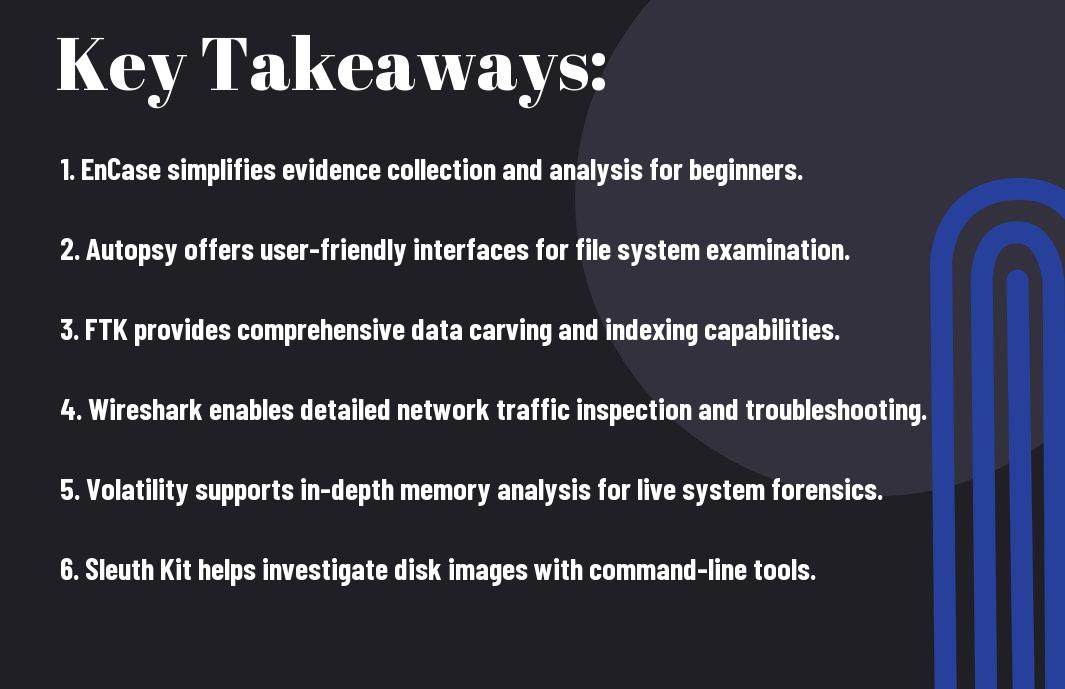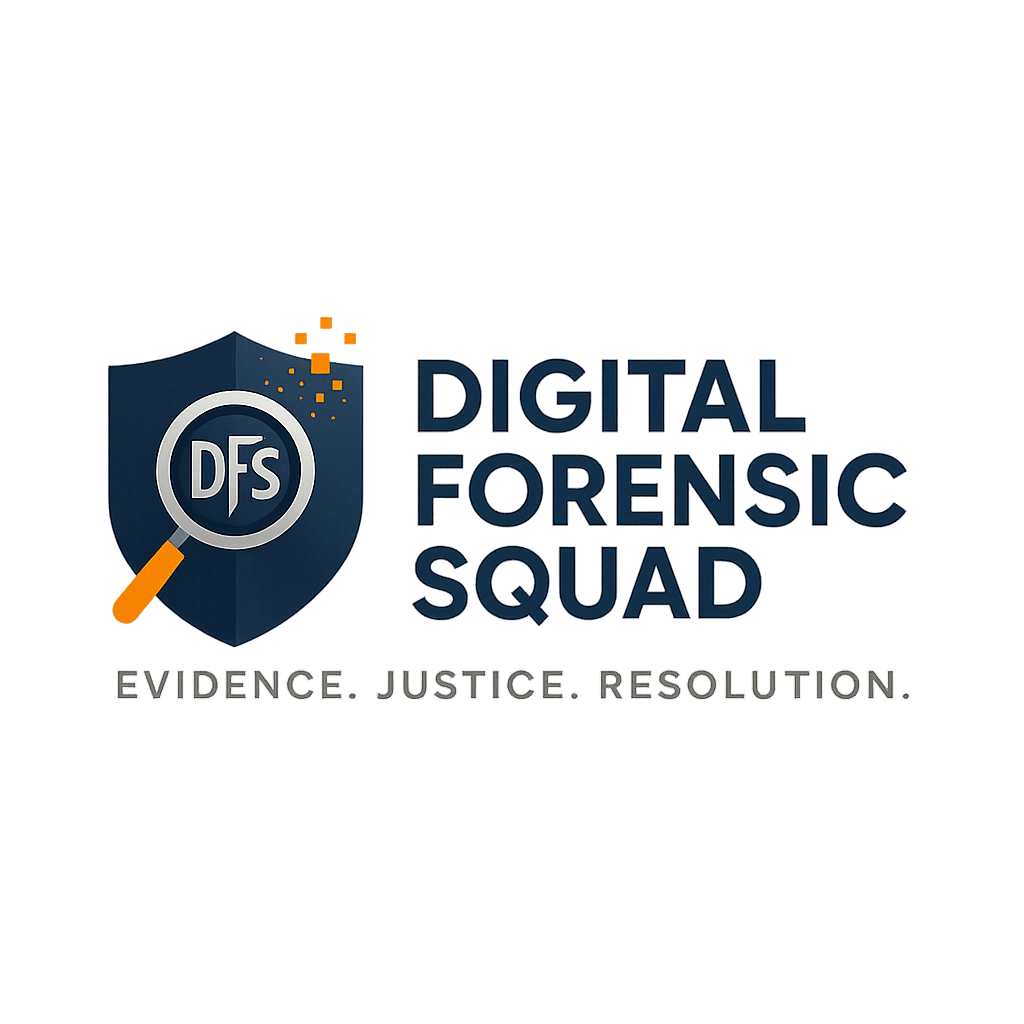Digital Forensics is a field that demands precision, attention to detail, and the right tools to effectively analyze digital evidence. As you launch on your journey into digital forensics, it’s important to equip yourself with the essential tools and software that can enhance your investigative capabilities. In this blog post, you will discover the fundamental resources that will lay the groundwork for your success, enabling you to tackle challenges and uncover valuable insights in the digital realm. Visit Digital Forensic Squad for specialised digital forensics services.
Key Takeaways:
- Familiarize yourself with basic digital forensics tools such as Autopsy, FTK Imager, and EnCase to streamline the investigation process.
- Understanding the importance of documentation and reporting tools, such as CaseGuard or Maltego, can enhance case management and presentation of findings.
- Stay updated on the latest software advancements and emerging tools in the field to ensure proficiency and adaptability in digital forensics practices.
Overview of Digital Forensics
A comprehensive understanding of digital forensics is vital for anyone entering this field. Digital forensics involves the identification, preservation, analysis, and presentation of digital evidence in a legally admissible manner. As cybercrime and data breaches become increasingly prevalent, the need for skilled professionals in digital forensics continues to grow, making it an crucial area of expertise for law enforcement, private sectors, and corporate environments.
Definition and Importance
After exploring the definition of digital forensics, you will appreciate its importance in investigating cybercrimes and protecting sensitive data. Digital forensics helps uncover the truth behind malicious activities, providing law enforcement and organizations with the evidence necessary to take action against cybercriminals. Its role in safeguarding your digital environment cannot be overstated, as it helps deter crime and creates a sense of security.
Key Concepts in Digital Forensics
Around the field of digital forensics, several key concepts are foundational to your understanding. These include data acquisition, chain of custody, forensic imaging, and analysis techniques. Each concept plays an integral role in ensuring that digital evidence is collected and handled correctly to maintain its integrity and reliability in court proceedings.
To probe deeper, the concept of data acquisition refers to the process of obtaining and duplicating digital information without altering the original data. The chain of custody is crucial for ensuring that evidence remains intact and can be trusted in legal contexts. Additionally, understanding forensic imaging allows you to create exact copies of hard drives or devices, while various analysis techniques enable you to interpret and present findings effectively. Together, these key concepts empower you to engage in digital forensics with confidence and professionalism.

Essential Tools for Digital Forensics
Clearly, accessing the right tools is vital for anyone stepping into the field of digital forensics. A combination of hardware and software will equip you with the necessary capabilities to conduct thorough investigations and gather evidence that is not only reliable but also admissible in court.
Hardware Tools
Among the vital hardware tools, you will find write-blockers, which are invaluable for protecting original data from being altered during an investigation. Additionally, external hard drives and specialized forensic workstations will allow you to securely store and analyze vast amounts of digital evidence without compromising its integrity.
Software Tools
At the core of digital forensics, you’ll find sophisticated software tools that can assist in data recovery, analysis, and reporting. These tools are designed to navigate complex file systems and extract meaningful evidence efficiently.
Tools such as EnCase, FTK, and Autopsy are industry standards that provide powerful functionalities like file recovery, deep analysis of disk images, and user-friendly interfaces for comprehensive reporting. Using these software packages can significantly enhance your investigative skills, allowing you to uncover hidden data, analyze system logs, and extract key evidence without risk of alteration. As you explore deeper into digital forensics, proficiency in these tools will undoubtedly bolster your confidence and effectiveness in the field.
Software Categories in Digital Forensics
After immersing yourself in the digital forensics field, you will encounter various software categories crucial for conducting thorough investigations. These tools can be divided into several key types, each designed to tackle specific tasks such as data recovery, examination of digital evidence, and analysis of findings. Understanding these categories can significantly enhance your proficiency in digital forensics and ensure your approach is systematic and effective.
Data Recovery Software
Recovery software is your first line of defense in salvaging lost or damaged digital information. It can restore files from corrupted storage devices, retrieve information from formatted media, and even recover deleted items. Investing in high-quality data recovery tools can make a substantial difference in the success of your investigations and provide you with invaluable access to critical evidence.
Investigation and Analysis Tools
Behind every successful digital investigation are specialized tools designed for in-depth analysis of data collected from various sources. These applications facilitate the examination of digital evidence, uncovering patterns and insights that are vital for building your case. With advanced search capabilities, visualizations, and reporting features, they help you make sense of complex information.
At the core of effective digital forensics, investigation and analysis tools empower you to dive deep into evidence with precision. They allow you to examine file systems, parse through extensive data logs, and analyze network traffic efficiently. Additionally, these tools often include features that help maintain the chain of custody, crucial for the legal integrity of your findings. Harnessing the right analysis software can greatly enhance your ability to uncover key details, create thorough reports, and support your conclusions with concrete evidence.

Legal and Ethical Considerations
All digital forensics professionals must take legal and ethical considerations seriously when managing investigations. Your actions can significantly impact the outcome of a case, so it’s important to adhere to professional standards. Engaging in discussions on platforms like What weapons of choice are in your forensics workstation … can aid your understanding of best practices and ethical dilemmas in the field.
Understanding Digital Privacy
One aspect of digital forensics you must grasp is the importance of digital privacy. You should be aware that unauthorized access to individuals’ data may lead to severe consequences, including legal ramifications for yourself and your organization. Striking a balance between investigating crimes and protecting privacy rights is vital.
Compliance with Regulations
One key element to ensure in your digital forensics career involves compliance with relevant regulations. Adhering to laws like the GDPR and local data protection regulations is important in maintaining the integrity of your work.
It’s important to familiarize yourself with these laws, as they dictate how you should collect, store, and analyze data. Failing to comply could result in severe penalties, including criminal charges and loss of professional credibility. Staying informed about updates and changes in legislation allows you to conduct investigations in a legally sound and ethically responsible manner, safeguarding both your work and the rights of individuals involved.
Best Practices for Newcomers
Keep your focus on establishing a solid foundation in digital forensics. Familiarize yourself with core concepts and methodologies, and actively participate in online forums or local meetups to network with professionals in the field. Always document your findings meticulously and practice ethical procedures in every investigation you undertake. This will not only enhance your skills but also build your reputation within the community.
Training and Certification
Certification in digital forensics can significantly bolster your qualifications and make you more marketable to potential employers. Consider pursuing recognized certifications such as the Certified Computer Forensics Technician (CCFT) or the Certified Information Systems Security Professional (CISSP). Online courses, workshops, and seminars are great avenues for obtaining both knowledge and credentials.
Building a Toolkit
About your toolkit, assembling a robust collection of tools is crucial as you begin your journey in digital forensics. A well-rounded toolkit should include software for data acquisition, analysis utilities, and reporting tools to effectively conduct investigations. Start with well-established options like Autopsy or FTK Imager, and gradually integrate more advanced tools as you gain experience. Regularly update and maintain your toolkit to ensure you can handle various cases effectively.
The strength of your toolkit plays a significant role in your success as a digital forensics investigator. The right combination of tools will enable you to perform thorough analyses, recover critical data, and gather invaluable insights from digital evidence. Make it a priority to learn how to use the tools effectively while staying current with technological advances. Monitoring developments in the field ensures that your toolkit remains relevant and efficient, allowing you to handle even the most complex investigations with confidence.
Future Trends in Digital Forensics
Despite rapid advancements in technology, the field of digital forensics continues to evolve, adapting to new challenges and opportunities. You can explore upcoming developments in this arena through Digital Forensics Tools and Techniques in 2025. As forensic practices keep pace with innovations, you must stay informed about the tools and methodologies shaping the future landscape.
Emerging Technologies
The integration of emerging technologies, such as artificial intelligence and machine learning, is transforming digital forensics. These innovations assist in automating data analysis, enhancing accuracy, and expediting incident responses. You should consider how adopting these technologies can streamline your investigations and improve overall efficacy in your digital forensic practice.
Evolving Threats and Challenges
Against the backdrop of these advancements, the digital landscape is also marred by increasingly sophisticated cyber threats. It is important to recognize that malware attacks, ransomware threats, and data breaches are continuously evolving, presenting new hurdles for digital forensic experts. You need to continuously update your knowledge and tools to effectively counter these emerging risks and safeguard digital evidence.
It is vital that you remain vigilant against these challenges as the cyber world becomes more complex. For instance, the rise of cryptocurrency-related crimes and the potential misuse of deepfake technology can complicate investigations significantly. By being proactive and staying educated, you can navigate these threats, ensuring your readiness to respond to any issues that arise in the digital forensics domain.
Summing up
With this in mind, equipping yourself with the necessary tools and software for digital forensics is vital for your journey in this field. By familiarizing yourself with key applications for data recovery, examination, and analysis, you enhance your ability to uncover evidence effectively. Whether it’s using EnCase, FTK, or open-source alternatives, each tool plays a significant role in your ability to conduct thorough investigations. Investing time in understanding these resources will empower you to make informed decisions and excel in your digital forensics endeavors.
FAQ
Q: What are the primary tools needed for beginners in digital forensics?
A: For newcomers in digital forensics, some of the fundamental tools include data acquisition software like FTK Imager and EnCase, which help in creating forensic images of storage devices. Additionally, analysis tools such as Autopsy and Sleuth Kit can be invaluable for examining data. Utility software like Disk Drill for recovering deleted files and password recovery tools are also beneficial for a comprehensive skill set.
Q: How can I gain hands-on experience with digital forensics tools?
A: Gaining hands-on experience can be achieved through various means. You can start with open-source tools to understand the basic functionalities. Online platforms such as Cybrary and Coursera offer courses that include virtual labs for practical experience. Participating in Capture The Flag (CTF) challenges specific to digital forensics can also enhance your skills as you tackle realistic scenarios in a controlled environment.


